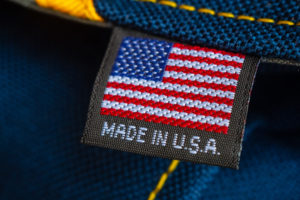USA, USA, USA – Overstating A Product’s Domestic Origins Could Be Costly

American consumers have shown an increased desire to purchase domestically-made products, or products that are “Made in the USA.” This can be for a variety of reasons, such as to bolster local economies or a perceived promise of quality, but, notably, domestically-made goods often carry a price premium. However, before waving the American flag, it is important to understand the rules regarding when a company can advertise an unqualified or qualified “Made in USA” claim.
I. FTC’s Made in USA Rule.
The Federal Trade Commission (FTC) recently promulgated the Made in USA Labeling Rule (“Rule”) (16 C.F.R. § 323). The Rule largely mirrors the FTC’s prior guidance on Made in USA claims, which was found in a 1997 Enforcement Policy Statement (“Enforcement Policy”). Importantly, the Rule allows the FTC to seek civil penalties, which currently stand at $43,792 per violation, so mistakes can be costly.
II. Unqualified “Made in U.S.A” Claims.
The Rule prohibits marketers from using unqualified U.S.-origin claims unless the following requirements are met:
- Final assembly or processing of the product occurs in the United States;
- All significant processing for the product occurs in the United States; and
- All or virtually all of the product ingredients or components are made and sourced in the United States.
The “all or virtually all standard” mirrors the Enforcement Policy, and while the Rule does not provide additional guidance, the FTC has previously explained that it will consider factors such as the proportion of U.S. manufacturing and the remoteness of foreign content when determining if the all or virtually all standard is met.
III. Qualified “Made in USA” Claims.
If a product does not meet the “all or virtually all standard,” U.S. origin claims must be qualified, or discontinued. A qualified claim demonstrates that the product is not entirely of domestic origin, and outlines exactly the extent, amount, or type of a product’s domestic content or processing.
An “Assembled in USA” claim is one example of a qualified claim. However, the Enforcement Policy explains that such a claim is inappropriate unless:
- Principal assembly occurs in the U.S;
- The assembly is substantial (rather than “screwdriver assembly”);
- The product’s last substantial transformation occurred in the U.S.
IV. Enforcement
The FTC recently signed a proposed settlement with Lions Not Sheep Apparel, LLC for misleading Made in USA claims. There, the company promoted its apparel with claims such as “Made in the USA”, “100% AMERICAN MADE” and “BEST DAMN AMERICAN MADE GEAR ON THE PLANET.” However, in most instances, the apparel consisted of wholly imported shirts and hats with limited finishing work, including printing or embroidery, performed in the USA. In fact, the CEO of Lions Not Sheep released a video on his social media explaining that he sources the t-shirts from China.
The settlement includes a $211,335 financial remedy and a prohibition on making future misleading U.S.-origin claims, among other things. Having promulgated the Rule, the FTC is likely to increase its enforcement against violators.
V. Moving Forward
Unqualified “Made in USA” claims require a high level of substantiation, which can often be difficult for marketers to meet. Prior to making an unqualified claim, marketers should trace a product’s manufacturing process to ensure that none of the components are foreign-made, and if they are, assess whether they violate the “all or virtually all” standard. Given the high penalties at stake for improper unqualified claims, it is important to closely monitor any changes in the manufacturing process to ensure a claim continues to be truthful.
If a product does not meet the standard for an unqualified claim, marketers can consider a qualified claim. Legal counsel can help tailor qualified claims to help meet the needs of a marketing team. Contact the authors to learn more.
